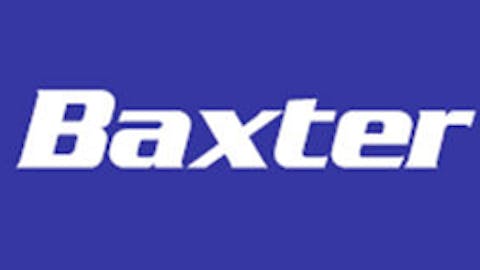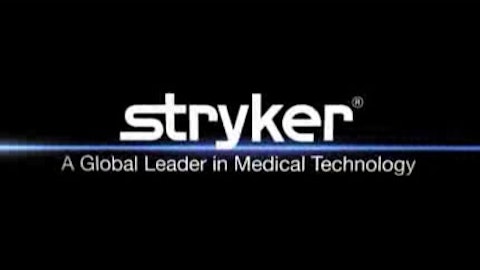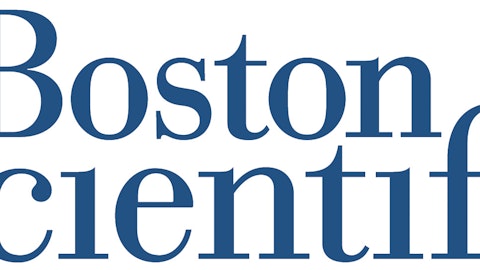As of this writing, the S&P 500 is up over 17% this year, while many of the biggest names in medical devices have run even farther. If we go back to last June 28 — when the US Supreme Court ruled in favor of Obamacare and its 2.3% excise tax on medical device makers’ gross revenues, medical device stocks have run even higher. Motley Fool Contributor Dan Caplinger described the potential impact of this tax very well back in April. In short, this is a tax on total revenue, not an income tax. That means it hits the bottom line much harder.
Here’s what the medical device industry’s share prices have done since the SCOTUS ruling:
The market is up over 26% since, and all four of these large players are up at least as much, led by Boston Scientific Corporation (NYSE:BSX)’s 70% gain. The question I think we all have: Is there any money left to make, or is too much of the future already baked into today’s share prices?
Don’t get too caught up in the past, or make bad assumptions about the future

And either decision could be wrong or right. But most importantly, they are bad conclusions to reach with the information at hand. Specifically, the lack of information:
STJ Forward PE Ratio data by YCharts
The table above adds another valuable metric — forward Price to Earnings ratio — that can help inform us if we are getting a good value. And as you can see, historically speaking the data has been all over the place. While Boston Scientific Corporation (NYSE:BSX) has spent a fair amount of the past several years carrying a higher forward valuation than today’s price, it’s also easily been the most volatile, as it has been a money loser for much of the period above. Similarly St. Jude Medical, Inc. (NYSE:STJ) has shown both stagnant revenue and negative income recently. Medtronic, Inc. (NYSE:MDT) and Stryker Corporation (NYSE:SYK), however, have both been consistently profitable, but also carry forward PE ratios that are heading higher than their recent historical valuations.
Here’s the rub: None of this tells us a whit about what’s actually happening with the businesses. And that’s what matters most.
So what’s happening? Americans are getting older
The Baby Boomers are starting to reach retirement age. My father retired about a year ago, and he’s had both knees replaced. My 89 year-old grandmother just had a knee replacement. While that may be anecdotal, there’s plenty of wide-scale data to support that the current crop of retirees are going to want active retirements, and that bodes well for Stryker Corporation (NYSE:SYK)’s continued growth. However, it does face very real threats from upstarts like MAKO Surgical Corp. (NASDAQ:MAKO) and its RIO surgical robot for hip and knee replacements.
While Stryker Corporation (NYSE:SYK) is a diversified company, knee and hip replacements account for 30% of revenues. Seeing a potential threat to such a central part of its business isn’t something the company — or investors — should dismiss. After all, MAKO Surgical Corp. (NASDAQ:MAKO)has an installed base of several hundred RIO systems in the US, already, and the most important metric – procedures per machine – is increasing, which means physicians are using this technology more and more.
If and when MAKO Surgical Corp. (NASDAQ:MAKO) receives approval for total knee replacement procedures (the vast majority of knee replacements,) this could be a serious game changer for both companies. However, that’s several years away, and Mako has to increase sales of its RIO system and at least get cash-flow positive, or it may run out of money before ever getting that far down the road.
I think the bigger risk to Stryker Corporation (NYSE:SYK) is if a large player, such as Johnson & Johnson (NYSE:JNJ) were to acquire MAKO Surgical Corp. (NASDAQ:MAKO) and throw its massive resources behind the technology. For now, I think there’s plenty of reasons for investors to take a hard look at Stryker. The 1.5% dividend doesn’t hurt.
Medtronic, Inc. (NYSE:MDT) is similarly set to benefit from an aging population, as well as the added effects of the “western diet” and the obesity challenges that leave so many Americans facing diabetes. With a 2% dividend that it’s increased every year (except one) since the mid-1990’s, and consistent earnings and growth, This is where I would put my money if I were buying one of the four. However, unlike MAKO Surgical Corp. (NASDAQ:MAKO), it faces limited seriously disruptive competition, and is incredibly established in the diabetes field.
St. Jude Medical, Inc. (NYSE:STJ) and Boston Scientific Corporation (NYSE:BSX) both need to show me consistent earnings over several quarters before I would even consider investing in them. As established companies, it’s time for the rubber to meet the road. I’m not convinced that St. Jude’s recent spate of acquisitions will pay off, and if you are counting on this, I’d recommend you stay on the sidelines, or open a starter position and watch earnings closely for the next year to see how things pan out.
Foolish bottom line
Medtronic, Inc. (NYSE:MDT) and Stryker Corporation (NYSE:SYK) are established, profitable businesses. Neither is exactly a steal at today’s prices, but both have delivered for years. With that said, I’d definitely watch out for competitive disruption for Stryker from MAKO Surgical Corp. (NASDAQ:MAKO) and be prepared to re-evaluate if it receives approval for total knee replacements.
While there is the potential for MAKO Surgical Corp. (NASDAQ:MAKO) to become the next Intuitive Surgical, Inc. (NASDAQ:ISRG), there is also heavy risk that the company will have to make additional stock offerings just to keep the doors open. I own a small position, but I’m not adding until the company becomes cash-flow positive. If you have a timeline to retirement measured in decades, taking a very small position and watching closely could pay off in spades. But don’t invest money you aren’t prepared to lose because there is significant risk.
Jason Hall owns shares of MAKO Surgical and Medtronic. The Motley Fool recommends MAKO Surgical . The Motley Fool owns shares of Medtronic.
The article Is Now the Time to Buy Medical Device Makers? originally appeared on Fool.com.
Copyright © 1995 – 2013 The Motley Fool, LLC. All rights reserved. The Motley Fool has a disclosure policy.







